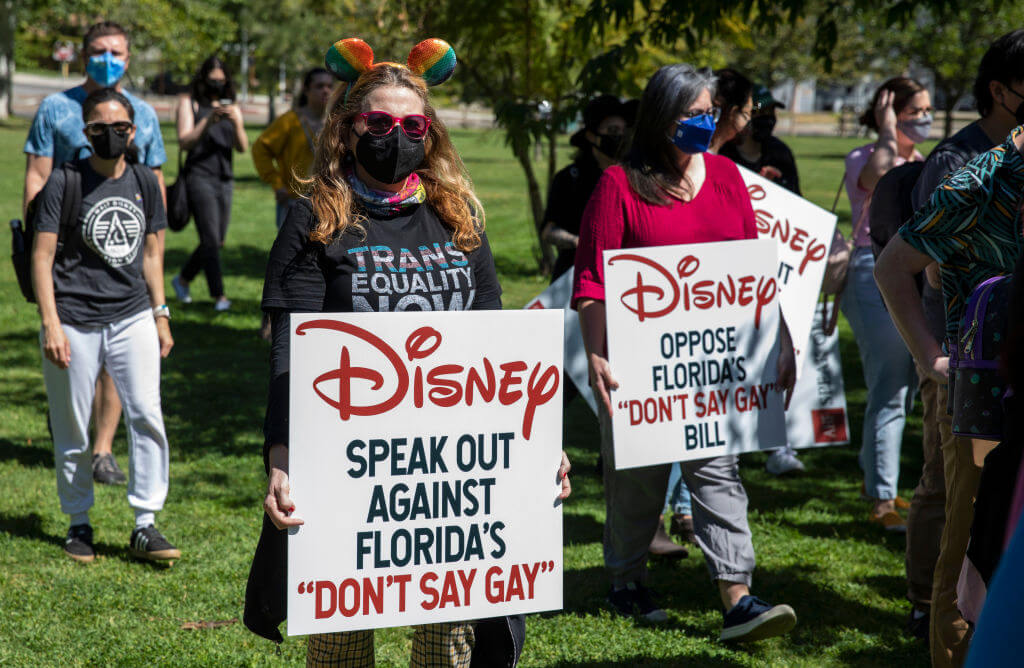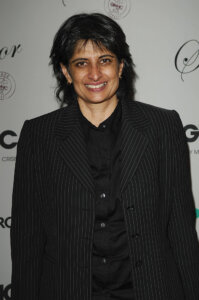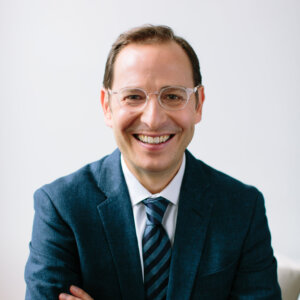I’m a Jewish gay man who resisted apartheid. LGBTQ rights in the U.S. are slipping away from us.
As we celebrate another Pride Month, our nation is backsliding, and our hard-fought gains are in peril.

Walt Disney employees and demonstrators during a rally against the Florida “Don’t Say Gay” bill at Griffith Park in Glendale, California, U.S., on Tuesday, March 22, 2022. Photo by Alisha Jucevic/Bloomberg via Getty Images
Last month, the world lost a transformational giant in the LGBTQ rights movement. Urvashi Vaid was a pioneering social justice activist, attorney and award-winning author. She was also one of my great human rights teachers.
Urvashi was bold, unflinching and driven. She introduced questions of race, nationality and ethnicity into the LGBTQ space in the early ’90s, at a time when it was very much dominated by white gay men and white lesbians. Her passion for equality was evident every time she spoke — whether it was the two of us at the watercooler when we worked on the same floor (me at the Gay Men’s Health Crisis, she at the Arcus Foundation, which supports LGBTQ social justice issues and Great Apes conservation) or before hundreds during a rally.

I remember our conversations fondly. Enveloped by the smell of coffee roasting from the nearby coffeepot, we spoke of the challenges of serving the LGBTQ and HIV-positive communities during the George W. Bush era and dreamed of a world in which more attention was paid to the people deeply impacted by the AIDS crisis.
I recall that in one impassioned speech at the National Equality March in 2009, she told the crowd, “There can be no lasting justice nor genuine equality for LGBTQ people until there is an end to the patriarchal way of thinking.” More than a decade later, her words still ring true.
For years, it seemed that the U.S. was making meaningful progress on the road to “lasting justice” and “genuine equality.” Courts struck down anti-gay laws. LGBTQ people were granted the freedom to serve openly in the military. Same-sex couples won the right to marry (of which I took advantage). However, as we celebrate another Pride Month, our nation is backsliding, and our hard-fought gains are in peril.
More and more, it seems the U.S. is moving toward a space where hate is permissible, where bigotry becomes commonplace, and where the tenets of our democracy around building bridges between cultures are fading away. Consider that in 30 states, legislators have taken up bills that would exclude transgender children from youth sports; in Texas and Alabama, families seeking gender-affirming care for their trans children now could face charges of abuse and prison time; and in Florida, the new “Don’t Say Gay” law prohibits education on sexual orientation and gender identity through third grade.
Each headline sends a bolt of fear through me. The LGBTQ community has faced bigotry like this before, yet I cannot help but wonder: Will we be worse off this time around? This frightening march toward inequality is a sobering reminder that oppression is a relentless adversary. However, history has taught us that these battles can be won if we keep fighting. I see shining examples of that perseverance every day in acts of resilience from around the world.
I think of a young lesbian couple in Tamil Nadu, India, who fled their homes in spring 2021 to be together despite their families’ disapproval. Their parents demanded their return. When that failed, they reported the two “missing.” After being tracked down, harassed and humiliated by police, the couple fought back by filing harassment charges against the police in the Madras High Court.
Their case drew such widespread attention that the presiding judge sought out education about same-sex relationships from health professionals before making his ruling on June 7, 2021. Not only did the lesbian couple win their case, but the judge ordered sweeping changes to tackle LGBTQ discrimination, including sensitivity training for police, the creation of gender-neutral bathrooms at schools and colleges and separate housing for gender non-conforming and trans prisoners to protect against sexual assault, among other reforms. The ruling has been hailed as a major win for gay rights in India.
Stories like theirs, of dogged determination in the face of oppression, fill me with equal parts hope and resolve. And it adds fuel to the resistance that is in my DNA as a South African who fled a dictatorship, as a gay man reared in a society that shunned homosexuality and as a Jewish person deeply connected to my heritage.
My own commitment to social justice is rooted in my experiences growing up as a Jewish gay man under apartheid in South Africa. I witnessed cruelties every day and grew to understand that these acts were rooted in hate. I even watched members of my own family stand up against injustice, including my late cousin Denis Goldberg who worked alongside Nelson Mandela and was jailed for 22 years for his anti-apartheid activism.
As a young man, I immigrated to the U.S. in 1977 to avoid serving in the South African army in defense of apartheid. I studied at the Julliard School to pursue my passion for music. It was while I was performing in some of New York City’s most underserved schools as a teaching artist in the 1980s that I came to understand the economic and racial divides that also existed here. My Jewish values compelled me to pursue a new passion then: working for justice and dignity for all people.
I am troubled by the ongoing erosion of our civil liberties in the U.S. today. Indeed, we are on the eve of what will most likely be a decision to overturn the fundamental rights of women in this country. In such fraught times, I again lean on my Jewish values, like hatmadah (to persevere). Pirkei Avot teaches that “You are not obligated to complete the work, but neither are you free to desist from it.” We know that no matter how grim circumstances seem, there is a human and Jewish imperative to continue laboring toward what is right. Tzedek, tzedek tirdof. Justice, justice shall you pursue.
As a society, we must not surrender to the bigotry that vilifies our differences. Let us instead be vigilant and keep up the fight. Let us build, in the words of my teacher Urvashi, “a bridge to a land where no one suffers prejudice because of their sex, their gender, their religion, or their human difference.”
To contact the author, email [email protected].

















